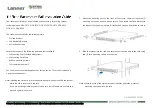
Operation Manual – HWPing
H3C S5100-SI/EI Series Ethernet Switches
Chapter 1 HWPing Configuration
1-3
Table 1-2
HWPing test parameters
Test parameter
Description
Destination address
(
destination-ip
)
For a TCP/UDP/jitter test, you must specify a destination IP
address, and the destination address must be the IP address
of a TCP/UDP/UDP listening service configured on the
HWPing server.
Destination port
(
destination-port
)
For a tcpprivate/udpprivate/jitter test, you must specify a
destination port number, and the destination port number
must be the port number of a TCP or UDP listening service
configured on the HWPing server.
Source interface
(
source-interface
)
z
For a DHCP test, you must specify a source interface,
which will be used by the HWPing client to send DHCP
requests. If no source interface is specified for the DHCP
test, the test will not succeed.
z
After a source interface is specified, the HWPing client
uses this source interface to send DHCP requests during
the DHCP test.
z
The IP address of the specified source interface will be
used as the source IP address of DHCP requests.
Source address
(
source-ip
)
For HWPing tests other than DHCP tests, you can specify a
source IP address for test packets, which will be used by the
server as the destination address of response packets.
Source port
(
source-port
)
For HWPing tests other than ICMP, DHCP and DNS, you
can specify a source port number for test packets, which will
be used by the server as the destination port number of
response packets.
Test type (
test-type
)
z
You can use HWPing to test a variety of protocols, see
Table 1-1
for details.
z
To perform a type of test, you must first create a test
group of this type. One test group can be of only one
HWPing test type.
z
If you modify the test type of a test group using the
test-type
command, the parameter settings, test results,
and history records of the original test type will be all
cleared.
Number of probes
per test (
count
)
For tests except jitter test, only one test packet is sent in a
probe. In a jitter test, you can use the
jitter-packetnum
command to set the number of packets to be sent in a probe.
Packet size
(
datasize
)
z
For ICMP/UDP/jitter test, you can configure the size of
test packets.
z
For ICMP test, the ICMP packet size refers to the length
of ECHO-REQUEST packets (excluding IP and ICMP
headers)
Maximum number of
history records that
can be saved
(
history-records
)
This parameter is used to specify the maximum number of
history records that can be saved in a test group. When the
number of saved history records exceeds the maximum
number, HWPing discards some earliest records.
















































